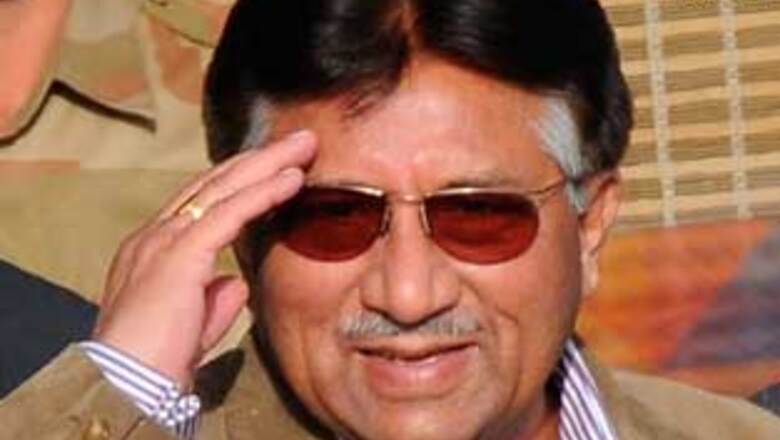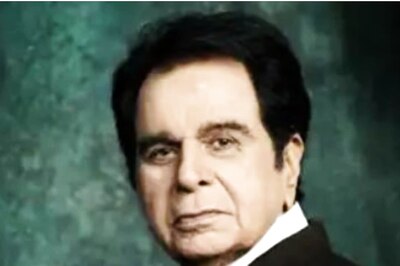
views
Karachi: Taking a strong anti-terrorism stance, former Pakistani president Pervez Musharraf on Monday urged concerted efforts to prevent militants from operating on the country's soil even as he extended his unequivocal support to the government, the army and spy agency ISI in their efforts to stamp out terrorism from the country.
Addressing a press conference in Karachi on his return from attending a conclave in New Delhi, he urged India and Pakistan to resolve their differences in a "sensible way" and "avoid whipping up war hysteria".
"War hysteria is negative as it creates differences between people of the two countries. The people need to be brought together for the success of the composite dialogue and peace process," said Musharraf, addressing his first full-fledged press conference after leaving office in August 2008.
"It is time for the Pakistani establishment to come out of the dark and accept that there foreigners with extremist agendas operating from Pakistani soil. We as Pakistanis need to know if there are foreigners on our soil or not. And I can say with confidence that whether you call them al-Qaeda, Uzbeks or outsiders, they are present in Pakistan. The government has to take action against them. It is for Pakistan to take action and not for foreign agencies to do so. We are getting notorious in the world because of them and every leader has pointed it out," he stated.
"Whenever the country is in trouble, the army needs to step in and restore order. I am not going to judge the Army Chief. He can take his own decisions," he further said.
"The situation in Pakistan is before your eyes. According to me there are three problems plaguing us - political disputes, law and order - which includes terror and extremism - and economic concerns. The government needs to tackle these and take Pakistan on the path of progress," Musharraf added.
At a time when General Kiyani has virtually put President Asif Ali Zardari on notice, Pervez Musharraf has indicated he wouldn't mind replacing him.
"If it's being offered and if i can be a useful president then i would want to contribute to the nation," he said.
Noting that "we live in a globalised world and not in a vacuum," Musharraf said Pakistan was putting itself in a difficult position by not taking action against militant groups operating in the country.
He also sought to debunk suggestions in the Indian media that there was no distinction between the militants, the Pakistani state and the Inter-Services Intelligence (ISI) agency.
"The government, the army and the ISI are all playing their roles in combating terrorism. We should support them and not demean their efforts," he contended.
Musharraf also defended an accord between the North West Frontier Province (NWFP) government and a radical cleric on imposing Shariat laws in Swat and six other districts of the province, saying it was in line with the demands of the people and would help restore peace in the area.
"Thousands of people had come out in the area. What did they want? They wanted speedier justice. That will eventually bring peace," he said.
"The people wanted speedy justice which was not possible because of the high court and the Supreme Court (appealing against orders of the trial courts). Now, these appeals will be heard by the Federal Shariat Court," Musharraf pointed out.
He also noted that the move to impose Shariat laws in seven districts of the North West Frontier Province (NWFP) had been initiated during his tenure in office.
"The demand had been made during my time. We had initiated discussions on it," Musharraf said.
Under the deal between the Tehreek-e-Nafaz-e-Shariat-e-Mohammadi (TNSM), or Movement for the Enforcement of Islamic Laws of radical cleric Maulana Sufi Mohammad, and the NWFP government, the Taliban that control the area would lay down their arms in return for the imposition of Shariat laws.
The US and other Western governments have roundly criticised the accord, saying it amounted to bowing before the Taliban.
Musharraf did not agree.
"I think we can work with some elements of the Taliban. If it brings peace, why not give it a chance?" he retorted.
Pakistan President Asif Ali Zardari has warned that he would validate the accord only after peace returned to the region.
On Monday, NWFP Chief Minister Haider Khan Hoti signed the documents for promulgating Nizam-e-Adl, as the Shariat laws are known.
This will now be sent to provincial Governor Owais Amhed Ghani and then to Zardari. They will become law once the president gives his assent.
The TNSM is believed to be pressuring the NWFP government to impose the new laws by March 15.



















Comments
0 comment